Bison Roundup - Custer State Park
Reliving America's West
Article Date: December, 2011
Article and Photography by Mark Quasius
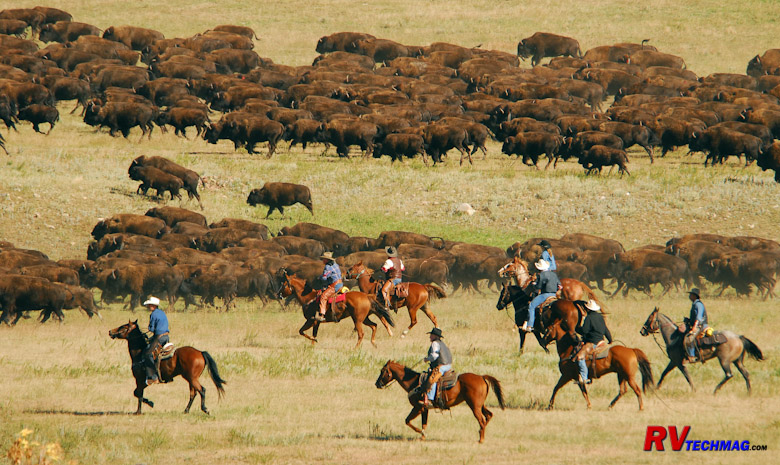
It begins with a large cloud of dust cresting the ridge in the distance. Soon the sounds of cowboy yells are heard,
and the lead animals burst through the cloud and thunder over the ridge as the riders herd 1,300 of these magnificent animals past the viewing
areas. It's reminiscent of a scene from Dances with Wolves but it's really the annual Bison Roundup at Custer State Park.
The Park
|
Custer State Park is located in South Dakota's Black Hills. The Black Hills are best known for Mount Rushmore, which is
the main reason that most tourists travel to this area. They are also very RV friendly, so it's particularly popular with RV owners. Custer
State Park is not your typical state park. It's an expansive recreational area with much to offer and worthy of national park status. You
can climb the Needles, hike around pristine Sylvan Lake, look out over the park from the Mount Coolidge fire tower or fish the many
streams in the area.
But the main attraction is its bison herd located around the wildlife loop. The wildlife loop is a nice blacktop road
in the southern portion of the park and home to the bison herds, which number between 1,100 and 1,300 animals.
|
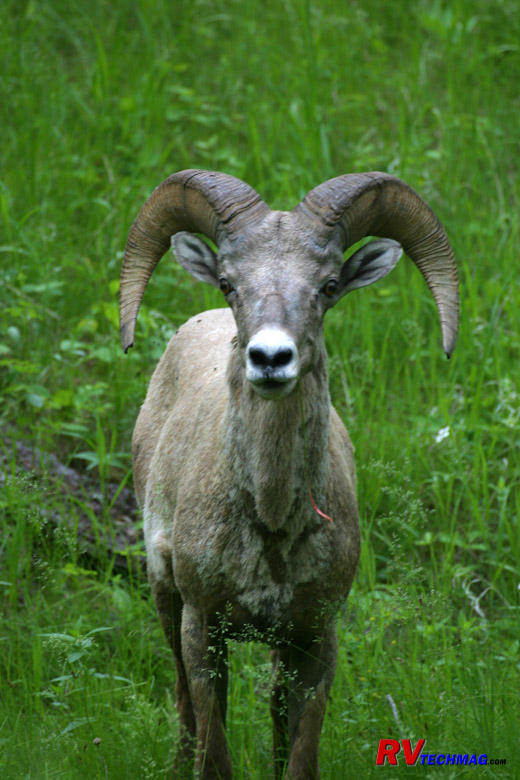
Bighorn sheep can frequently be seen in Custer State Park.
|
|
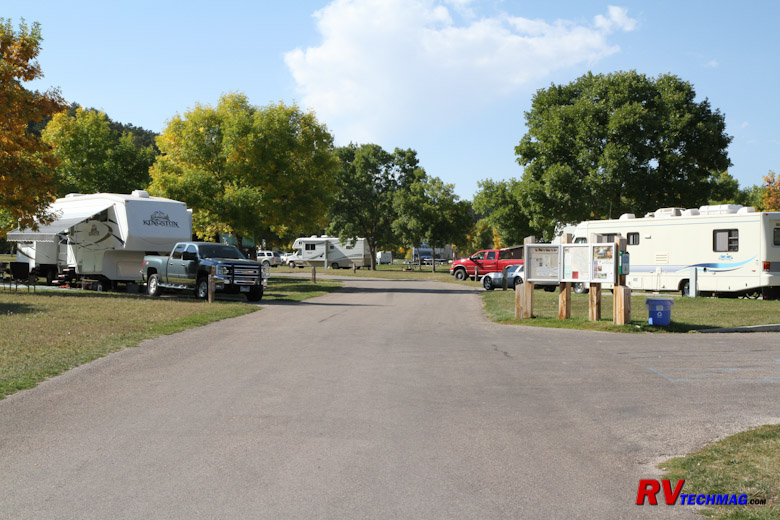
Custer State Park has a number of great campgrounds for RV owners. A large number of RV parks can also be found
in neighboring communities.
|
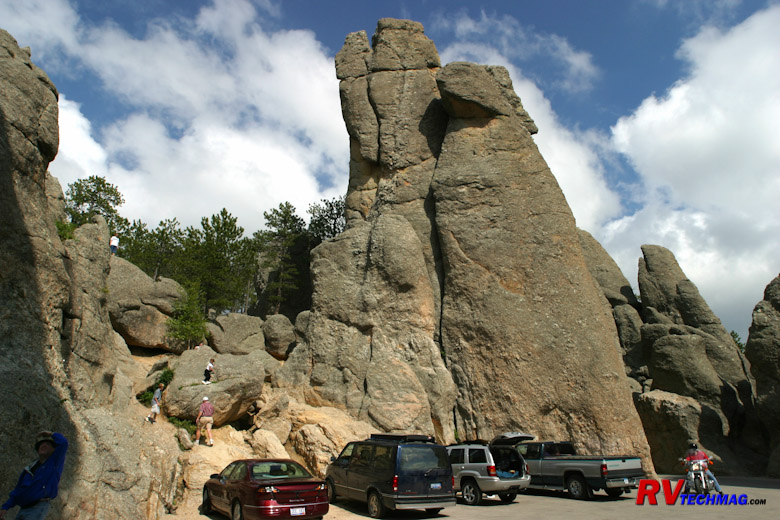
The Needles Highway passes through a number of tunnels on the way to the Needle's Eye, a popular climbing place for visitors.
|
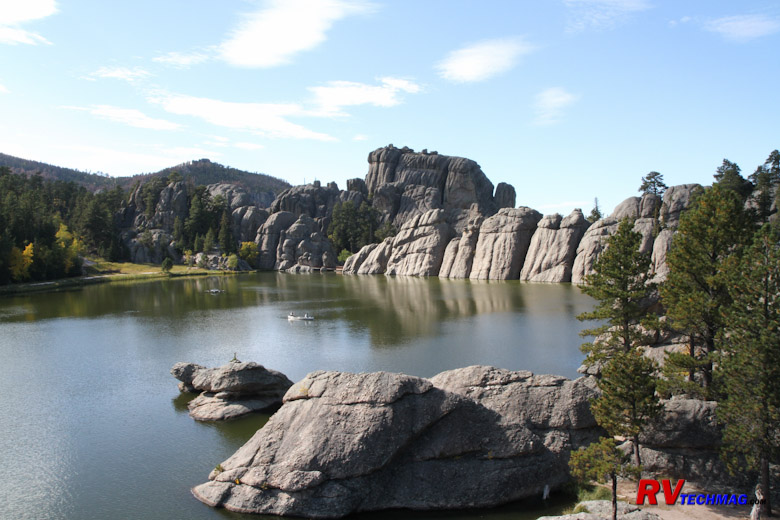
Sylvan Lake is one of many lakes found in Custer State Park.
|
Bison Crossing
During the spring and summer, tourists drive the wildlife loop through the park. Prairie dog villages can be found, as
well as pronghorn antelope, bighorn sheep, mule deer, and bison. Wild burro herds are found in two areas of the park and are a big favorite
with visitors. They are born panhandlers and love to eat carrots, so if you pack a bag of baby carrots, you'll undoubtedly make a bunch
of new friends.
The odds are good that you will encounter a bison jam when driving this loop. In fact we've frequently popped our heads
out an open sunroof to photograph them up close while still remaining in the safety of our own SUV. Large herds roam the area and graze on
the grasses. If you happen to come upon a herd crossing the road you'll just have to wait a bit, but no one seems to mind - and who would want
to argue with a buffalo anyway?
New calves are born every spring, so the park has an annual roundup at the end of September when all of the bison are
herded into corrals at the southern end of the park. Once in the corrals the bison are checked over and the herd is trimmed to 1,000 animals,
the number that the park's resources can support during the winter months. The bison are inoculated and tested.
Animals deemed to be excess are then placed in a separate corral to be auctioned off in October. Some of these go to
meat producers, but the majorities go to bison ranchers as breeding stock. The money from this auction goes to help support the operation of
various South Dakota state parks.
|
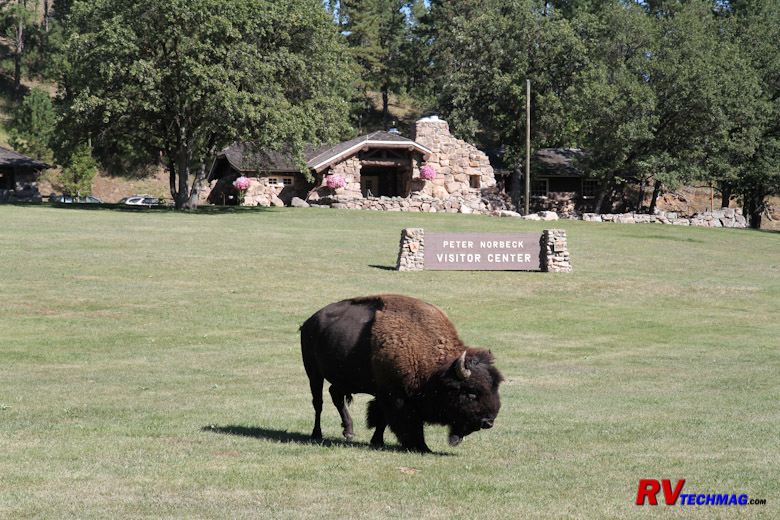
The Peter Norbeck Visitor Center is the best place to pick up information about the park.
|
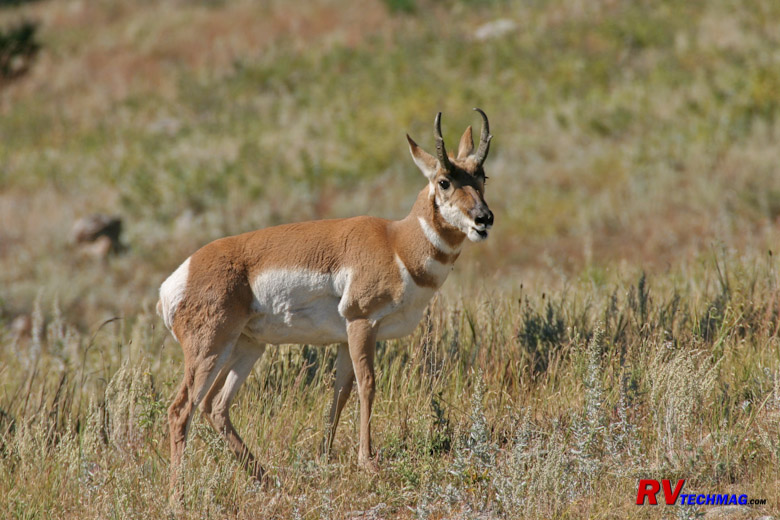
Pronghorn antelope are very fast and can be seen along the wildlife loop road.
|
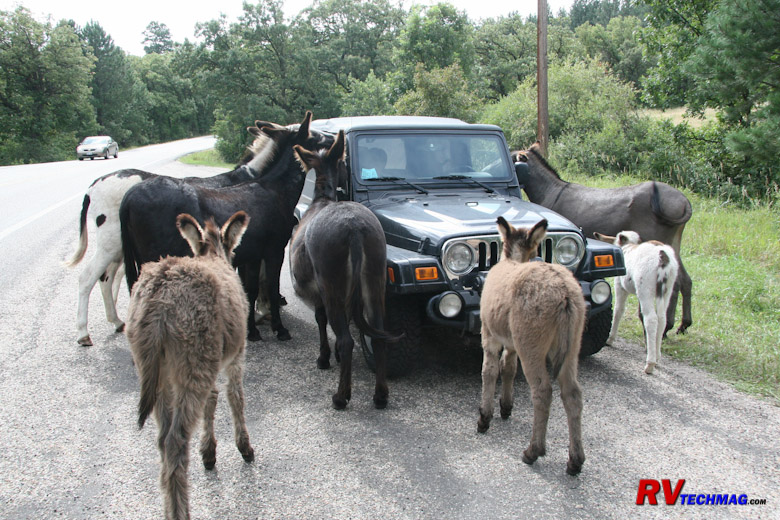
The wild burros are frequent panhandlers in the park. If you bring a bag of baby carrots, you'll make quite
a few friends.
|
The Festivities
The actual roundup occurs on Monday, but the prior weekend is filled with activities as well. Saturday is the annual
Arts Festival. A large number of vendors set up tents near the State Game Lodge. Anything you can think of that's western related can be
found here. A number of rotating acts are always on stage in the entertainment tent, from music to cowboy poets, to Native American dancers.
Sunday is best known for the Buffalo Wallow Chili Cookoff. This past fall, 14 competitors set up camp, vying for the top
prize. Visitors can buy chili-sampling tickets, which allow them to sample each vendor's chili. Tasters then cast votes by placing a special coin
into the glass jar of their favorite cook. The vendor with the jar containing the most coins wins. If chili sampling isn't your thing, you can
always participate in the buffalo chip flip. Try finding that at your local mall. We passed on the chip flip, but did partake in the chili sampling.
|

|
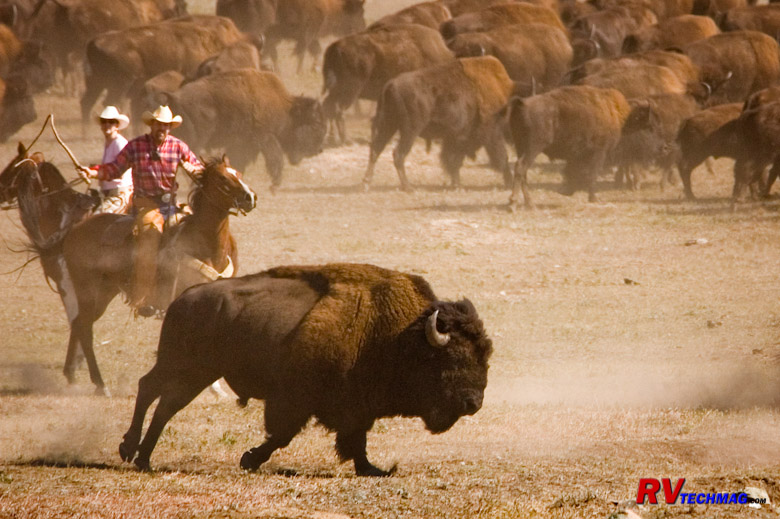
|
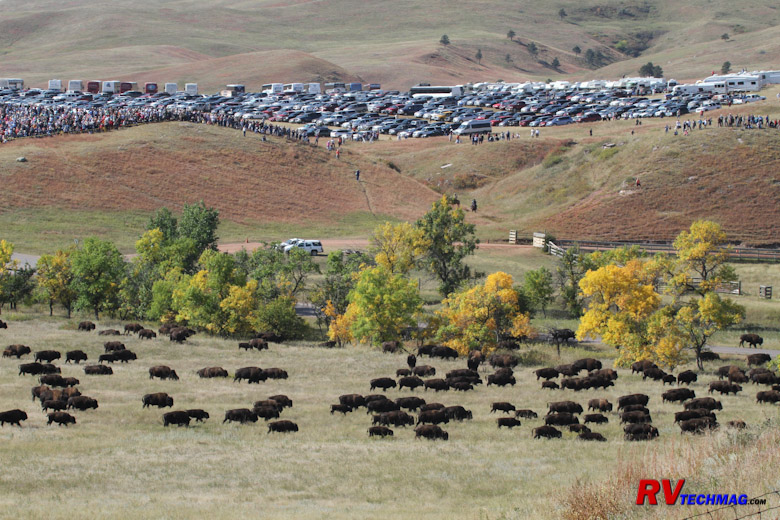
Two large viewing areas are provided so that visitors can view the bison in safety.
|
|
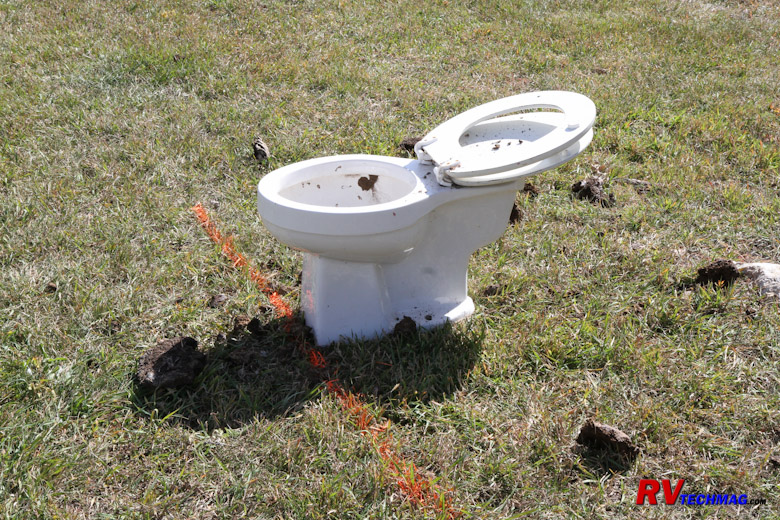
The buffalo chip toss contest is a unique sport that you'll rarely find elsewhere.
|
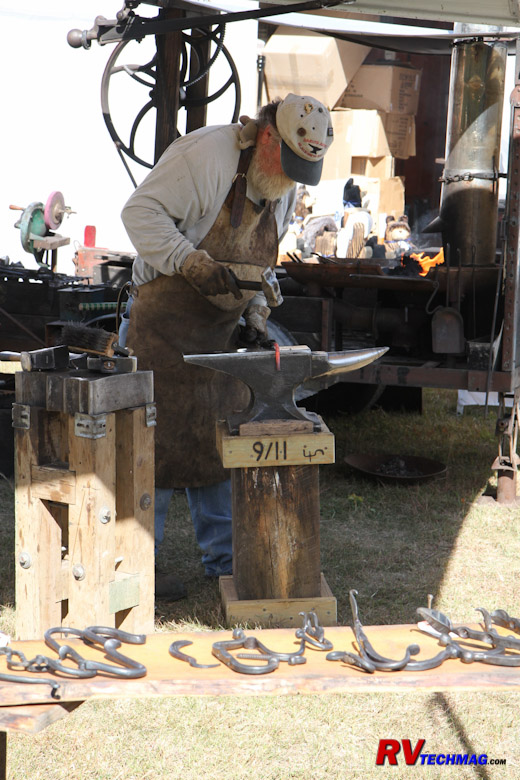
Various artists display their wares during the annual art festival the Saturday before the roundup.
|
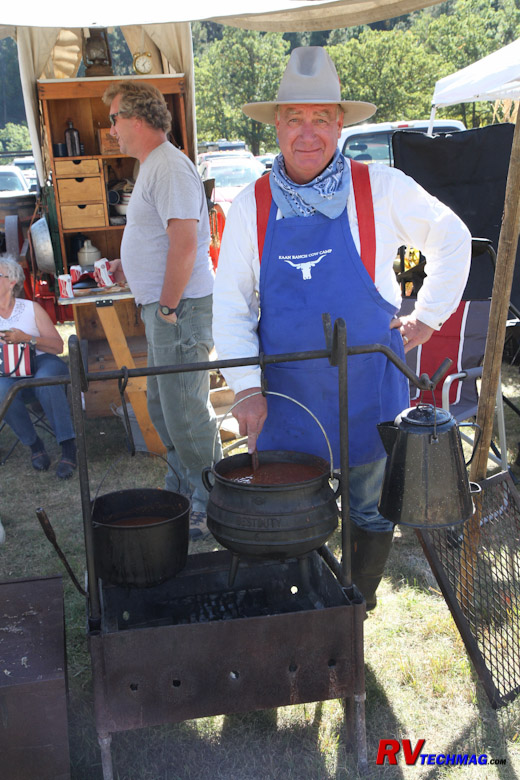
The Buffalo Wallow Chili Cookoff is a great time to sample the different chili recipes and vote for your favorite.
|
The roundup itself is a major undertaking. Sixty wranglers on horseback herd the bison toward the corral area.
Twenty of these are park staff who work with the animals year-round. Another 20 are returning cowboys, who are invited back. The final
20 are drawn from a lottery that typically has 150 entrants.
As anyone familiar with these animals knows, bison have a mind of their own and don't take well to being told
what to do. During the roundup a few bison generally break away from the herd and try to make a run for it, but the wranglers always
manage to get them back into the herd. It's not an easy ride in the park for these cowboys. Horse and rider need to navigate some rough
terrain and always need to be aware of where the bison are and what they are doing.
State Brand
Viewing areas are set up in two safe locations and visitors may not leave those areas from the time the roundup
begins to when the bison are safely in the corrals. This year approximately 2,400 vehicles plus 42 tour busses were present, so you need
to arrive early to nail down a prime spot. Fortunately there were adequate toilet facilities, and a pancake breakfast was served in those
viewing areas, so the wait wasn't all that bad. The actual roundup began at 9:30 a.m. and the bison were in the corral by about 11:30.
Once the bison are in the corral the visitors can take shuttle busses from the viewing area parking lots to the
corrals. An overhead catwalk is available, but most visitors watch from the fences. The bison barbecue was the No. 1 choice for lunch and
came complete with beans, chips, a soft drink, and a large chocolate chip cookie.
|
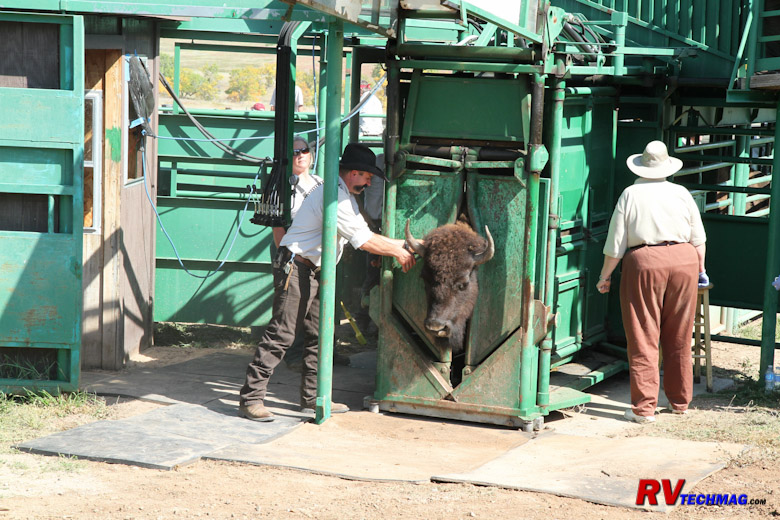
Each animal is held in a holding clamp for inspection, inoculation, and tagging. Females are checked for
pregnancy at this time.
|
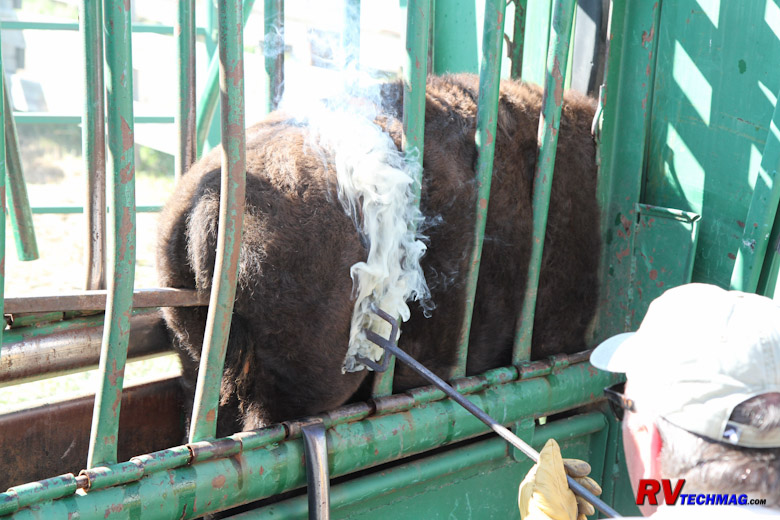
Bison calves are branded with the Custer State Park brand and given ear tags in a special area designed for smaller animals.
|
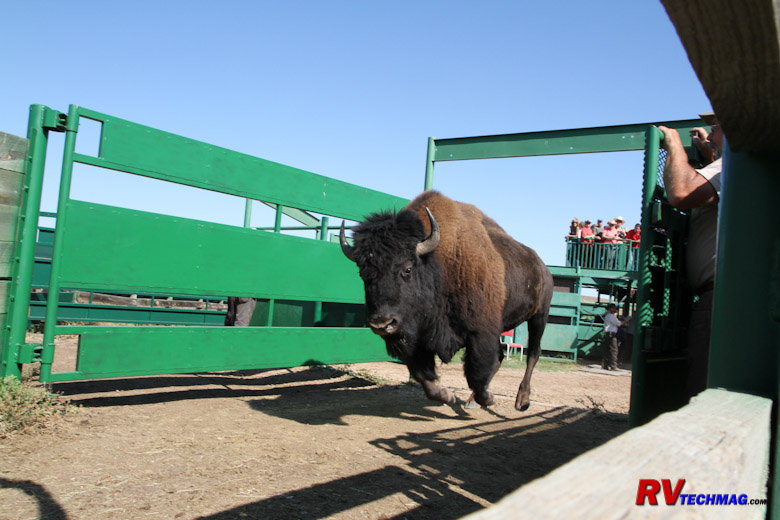
Once the inspection is completed the clamps are released, and the animal bolts free and is ushered into a holding area.
|
After lunch the wranglers began to work the bison. Individual animals were drawn out of the holding corrals and
herded into chutes. The next stop was a steel holding fixture with hydraulic clamps that held them still so that the herd manager could
safely read their ear tag, inspect the animal, and make a decision as to whether to keep it or send it to the auction corral. Females
were checked for pregnancy, which is factored into the estimated herd size for the following year. Inoculations were given as needed.
Once the animal was ready to be released the appropriate exit gate was opened in the receiving corral and the
clamps were released. The animal then thundered away and was directed to its holding corral by more wranglers. Calves were sent to a
separate pen so that they could be given the Custer State Park brand, ear tags, and special inoculations.
The Black Hills and Custer State Park are very RV friendly. Custer State Park has campsites available, but they
are generally booked up well in advance for this event. Many RVers choose to stay at the many full-hookup campgrounds in Hill City,
Custer, or Keystone. Any of these can be a great choice to view the attractions in the area, such as Wind Cave, Mount Rushmore,
Harney Peak, Jewel Cave, or the many tourist traps south of Rapid City. It's also not that much farther to Wall Drug or the Badlands
either, so the Black Hills make for a good base camp location for a multitude of activities. Or, you can just sit back, relax, and
have another bison burger.
Source
Return to Home Page
If you enjoyed this article be sure to recommend RVtechMag.com to your friends, like us on Facebook or Twitter
or subscribe to our RSS feed.



|




















